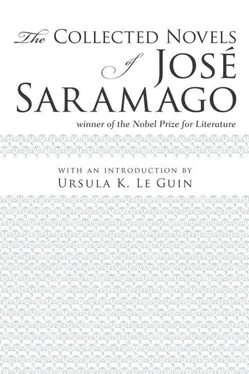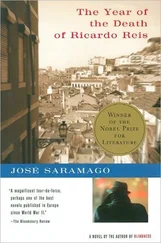Et ego in illo, said Padre Bartolomeu Lourenço inside the coach-house, thus announcing the theme of his sermon, but today he was not striving for vocal effects, for the tremulous vibrato that would stir his audience, the urgent note in his exhortations, the persuasive pauses. He spoke the words that he had written, and others that suddenly came to mind, the latter negating the former, calling them into doubt, or putting some new slant on their meaning, Et ego in illo, yes, and I am in him, I, God, in him, man, in me, who am man, are you, who is God, God resides in man, but how can God reside in man if God is immense and man such a tiny part of God’s creation, the answer is that God resides in man through the sacrament, that is clear and could not be clearer, but because He resides in man through the sacrament, it is essential that man should receive the sacrament, God, therefore, does not reside in man whensoever He wishes, but only when man wishes to receive Him, therefore one could say that to some extent the Creator has made Himself the creature of man, so a great injustice was done to Adam when God did not reside in him, for there was still no sacrament, and Adam might well argue that because of a single transgression God denied him the tree of life forevermore and the gates of paradise were closed to him for all eternity, whereas his descendants, who have committed many more sins and of a much more serious nature, have God inside them, and are allowed to eat freely from the tree of life, if Adam was punished for wishing to resemble God, how do men come to have God inside them without being punished, and even when they do not wish to receive Him they go unpunished, for to have and not to wish to have God inside oneself amounts to the same absurdity, and the same impossible situation, yet the words Et ego in illo imply that God is inside me or God is not inside me, how did I come to find myself in this labyrinth of yes and no, of no that means yes, of yes that means no, opposed affinities, allied contradictions, how shall I pass safely over the edge of the razor, well, summing up, before Christ became man, God was outside man and could not reside in him, then, through the Blessed Sacrament, He came to be inside man, so man is virtually God, or will ultimately become God, yes, of course, if God resides in me, I am God, I am God not in triune or quadruple, but one, one with God, He is I, I am He, Durus est hie sermo, et quis potest eum audire.
The night grew chilly. Blimunda had fallen asleep, her head resting on Baltasar’s shoulder. Later he accompanied her indoors and they went to sleep. The priest went out on to the patio, and remained standing there all night, watching the sky and murmuring in temptation.
SEVERAL MONTHS LATER, a friar consulted by the Holy Office of the Inquisition wrote, in his critical assessment of the sermon, that the author of such a text was more worthy of applause than dismay, more deserving of admiration than scepticism. The friar in question, Friar Manuel Guilherme, must have felt some sense of foreboding even while recommending admiration and applause, some imperceptible trace of heresy must have passed to his pituitary gland as he struggled to silence the fears and doubts that must have assailed the compassionate censor as he listened to that sermon being delivered. And when it is the turn of another venerable scholar, Dom António Caetano de Sousa, to read and censure, he confirms that the text he has just examined contains nothing contrary to holy faith and Christian morals, he does not dwell on the doubts and fears that appear to have provoked some disquiet in the first instance, and urging in his closing comments that Dr Bartolomeu Lourenço de Gusmão be held in the same high esteem as that shown him by the Court, thus using the influence of the Palace to whiten doctrinal obscurities that probably warrant closer investigation. However, the final statement will be made by Padre Boaventura of St Julian, the royal censor, who concludes his eulogies and effusions by declaring that only silence could adequately express his sentiments of wonder and reverence. Those of us who are closer to the truth felt obliged to ask ourselves what other thundering voices or more terrible silences would respond to the words the stars heard on the Duke of Aveiro’s estate while an exhausted Baltasar and Blimunda slept soundly, and the Passarola in the darkness of the coach-house strained its metallic frame in order to catch what its inventor out on the open patio was declaiming to the skies.
Padre Bartolomeu Lourenço has three, if not four, separate existences, and only when he is asleep, for even when dreaming differently, once awake, he cannot tell whether in his dream he was the priest who ascends the altar to celebrate Mass canonically, the scholar who is so highly esteemed that the King goes incognito to the Royal Chapel and listens to his sermons from behind a curtain, the inventor of the flying machine and the various mechanisms for draining ships that have sprung a leak, and this other, composite man, riddled with fears and doubts, who is a preacher in church, scholar in the academy, courtier in the Palace, and visionary and comrade of ordinary working-class people in São Sebastião da Pedreira, and he turns anxiously to his dream in an attempt to reconstruct the fragile and precarious unity that is shattered the moment he opens his eyes, nor does he need to fast like Blimunda. He has abandoned the familiar readings of the doctors of the Church, of scholars versed in canon law, of the various scholastic theories about essence and being, as if his soul had grown weary of words, but since man is the only animal who can be taught to speak and write long before achieving any social or intellectual standing, Padre Bartolomeu Lourenço makes a detailed study of the Old Testament, especially the first five books, the so-called Pentateuch, which is known as the Torah among the Jews, and as the Koran among the followers of Mohammed. Inside any of our bodies, Blimunda would have the power to see our organs and our wills, but she cannot read our thoughts, nor would she understand them, to see a man thinking as in a single thought, such opposed and conflicting truths, yet without losing one’s mind, she were she to see it, he for having such thoughts.
Music is something else. Domenico Scarlatti brought a harpsichord to the coach-house, he did not carry it himself, but hired two porters who, with poles, ropes, and a pad filled with horsehair, and much perspiration on their brows, brought it all the way from the Rua Nova dos Mercadores, where it was purchased, to São Sebastião da Pedreira, where it would be played, Baltasar accompanied them to show the way, but they required no other assistance from him, for this method of transportation depends on skill and experience, on knowing how to distribute the weight and combine forces like the pyramid in the traditional dance known as the Bica, knowing how to use the ropes and poles in order to set up a steady pace, these, after all, are the secrets of the porter’s trade and are as valid as any other, for a tradesman worthy of the name tries to acquire as many secret skills as he can. The Galician porters put the harpsichord down outside the gate, for no one wanted them to discover the existence of the flying machine, so Baltasar and Blimunda had to carry it into the coach-house themselves, a hazardous job, not so much because of its weight as because they did not know how to go about it, not to mention that the vibration of the chords were like anguished cries tugging at their heart-strings, which were also seized by alarm and dismay in the face of such extreme fragility. That same afternoon Domenico Scarlatti arrived, sat himself down and began to tune the harpsichord, while Baltasar wove willow canes and Blimunda sewed the sails, jobs they could carry out in silence without disturbing the music. Once he had finished tuning the instrument, adjusting the jacks, which had been disturbed in transit, and checking the duck quills one by one, Scarlatti began to play, starting off by letting his fingers glide over the keys, as if he were releasing notes that had been imprisoned, then organising the sounds in tiny sections, as if choosing between the right and the wrong notes, between harmony and discord, between phrasing and pauses, in short, as if giving new expression to what had previously seemed fragmentary and dissonant. Baltasar and Blimunda knew very little about music apart from the plain-chant sung by the friars, on rare occasions the operatic swell of the Te Deum, popular airs from the city and countryside, some familiar to Blimunda, others to Baltasar, but nothing that could even remotely be compared to the sounds the Italian drew from the harpsichord, which seemed as much a childish game as some fulminating oath, as much a divertissement for angels as the wrath of God.
Читать дальше












